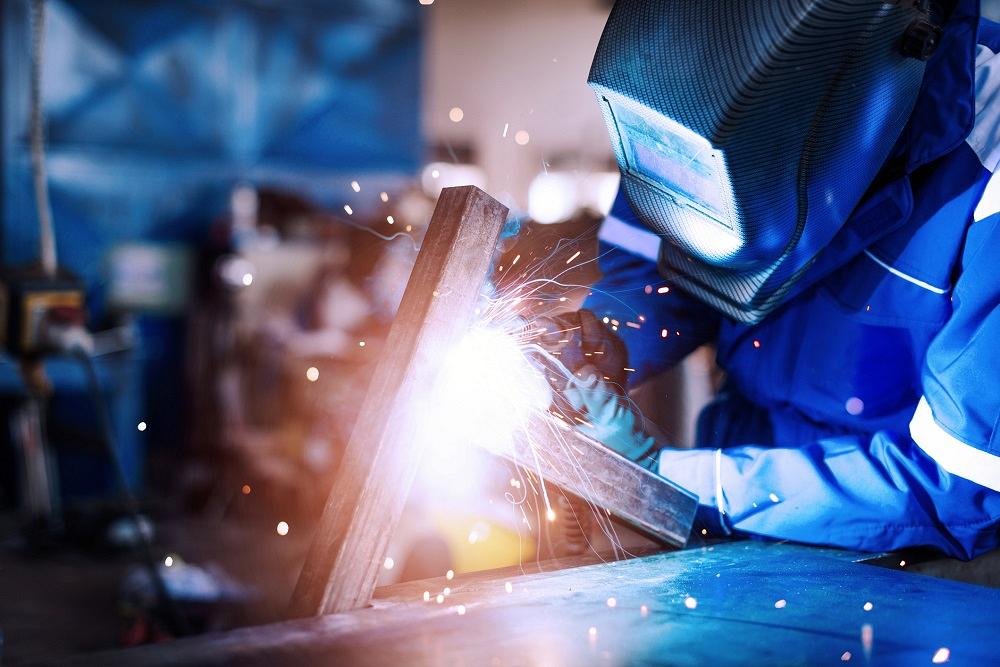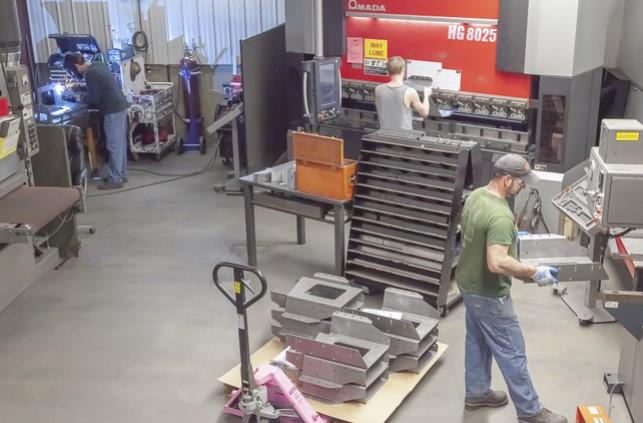Senior Editor
- FMA
- The Fabricator
- FABTECH
- Canadian Metalworking
Categories
- Additive Manufacturing
- Aluminum Welding
- Arc Welding
- Assembly and Joining
- Automation and Robotics
- Bending and Forming
- Consumables
- Cutting and Weld Prep
- Electric Vehicles
- En Español
- Finishing
- Hydroforming
- Laser Cutting
- Laser Welding
- Machining
- Manufacturing Software
- Materials Handling
- Metals/Materials
- Oxyfuel Cutting
- Plasma Cutting
- Power Tools
- Punching and Other Holemaking
- Roll Forming
- Safety
- Sawing
- Shearing
- Shop Management
- Testing and Measuring
- Tube and Pipe Fabrication
- Tube and Pipe Production
- Waterjet Cutting
Industry Directory
Webcasts
Podcasts
FAB 40
Advertise
Subscribe
Account Login
Search
Custom metal fabricators in essential supply chains step up
Customer diversity is the industry’s saving grace as COVID-19 continues spread
- By Tim Heston
- March 30, 2020

Custom metal fabricators with diverse customer bases and strong balance sheets keep busy in the face of COVID-19 uncertainty. Getty Images
It’s been an historic two weeks. Millions have filed for unemployment. Many parts of the economy have effectively shut down. Thing is, if you talk to some custom metal fabricators, you wouldn’t know it. Outside the health precautions like distancing in certain departments, many fabricators—especially those where local and state governments have deemed their business essential—are churning along, with business busier than usual.
The other day I spoke with PJ Swett, vice president of operations at Prototek, a custom metal fabricator with plants in New Hampshire, Wisconsin, and California, who said the company remains busy—and has even hired a few people who’ve been laid off from restaurants and other customer-facing service-sector jobs. “Business is still very strong, and buyers are placing a lot of orders,” Swett said.
The company serves a diverse supply chain and does a fair amount of business in the defense and medical supply chains, so it’s been deemed an essential business and permitted to stay open. It has a good supply of masks and gloves, and they’re in touch with customers and vendors (especially in the medical supply chain) to ensure there’s enough to go around.
Everyone on the floor is maintaining a safe distance. They already were at a safe distance in the cutting and bending departments, of course, but the operation has had to spread out workers in other areas, particularly grinding and assembly.
Prototek’s customer mix shifts continually—low-volume and prototype work is its niche, after all—and it’s a trait that many custom fabricators share. That adaptability will come in very handy in the coming weeks, and it shows just how resilient the custom metal fabrication business model really is.
In fact, some fabricators are stepping up to meet the needs of the crisis head-on. Consider Maryland-based Marlin Steel, which has ramped up its operations to supply test tube racks for COVID-19 testing facilities. As the company stated in an e-newsletter, “These test tube racks were made possible by our team’s diligence and quick turnaround, as we raced around the clock to fill an emergency test tube rack order and get these critical products manufactured and shipped to a large health care provider, where they will be used to save lives, expedite testing, and help combat the spread of COVID-19.”
In the short term at least, businesses everywhere are experiencing the economy in entirely opposite ways. Food processing and medical supply chains, as served by Marlin Steel and others, are running full out, while others have virtually stopped. Especially now, customer diversity is custom fabrication’s saving grace.
“With our diverse customer base, we are classified as a critical manufacturer that supports multiple essential and critical manufacturers. And we are in a good cash position and will be reviewing purchases for good deals now.” So said Jeff Cupples, vice president of operations at Cupples J&J Co. Inc., a large contract metal fabricator and machining operation based in Tennessee.
Many fabricators in a position to buy might be finding good deals in the coming months, for equipment and perhaps entire companies. Considering the interest rate situation and the strong balance sheet at many fab shops, I wouldn’t be surprised to see a significant uptick in acquisitions after the dust settles.
Of course, all this assumes local and state governments deem a metal fabricator an essential business. That's not happening everywhere, even if a fabricator's products feed into a critical supply chain. That's a real problem, and it's one that manufacturing trade groups, including the Fabricators & Manufacturers Association, International, aim to address.
Regardless, if a shop stays open, it's not business as usual. For many, customer and product mixes might be changing. While shops adapt to a shifting customer mix, they face a forecast that could be somewhat or even significantly positive on the one hand, incredibly dire on the other. No matter how strong a fabricator’s balance sheet is, it’s tough to survive if demand everywhere falls off a cliff. But if a fabricator has a strong cash position and a diversified customer base serving critical industries, the opportunities could be tremendous.
subscribe now

The Fabricator is North America's leading magazine for the metal forming and fabricating industry. The magazine delivers the news, technical articles, and case histories that enable fabricators to do their jobs more efficiently. The Fabricator has served the industry since 1970.
start your free subscriptionAbout the Author

Tim Heston
2135 Point Blvd
Elgin, IL 60123
815-381-1314
Tim Heston, The Fabricator's senior editor, has covered the metal fabrication industry since 1998, starting his career at the American Welding Society's Welding Journal. Since then he has covered the full range of metal fabrication processes, from stamping, bending, and cutting to grinding and polishing. He joined The Fabricator's staff in October 2007.
- Stay connected from anywhere

Easily access valuable industry resources now with full access to the digital edition of The Fabricator.

Easily access valuable industry resources now with full access to the digital edition of The Welder.

Easily access valuable industry resources now with full access to the digital edition of The Tube and Pipe Journal.
- Podcasting
- Podcast:
- The Fabricator Podcast
- Published:
- 04/16/2024
- Running Time:
- 63:29
In this episode of The Fabricator Podcast, Caleb Chamberlain, co-founder and CEO of OSH Cut, discusses his company’s...
- Trending Articles
Tips for creating sheet metal tubes with perforations

JM Steel triples capacity for solar energy projects at Pennsylvania facility

Are two heads better than one in fiber laser cutting?

Supporting the metal fabricating industry through FMA

Omco Solar opens second Alabama manufacturing facility

- Industry Events
16th Annual Safety Conference
- April 30 - May 1, 2024
- Elgin,
Pipe and Tube Conference
- May 21 - 22, 2024
- Omaha, NE
World-Class Roll Forming Workshop
- June 5 - 6, 2024
- Louisville, KY
Advanced Laser Application Workshop
- June 25 - 27, 2024
- Novi, MI



























